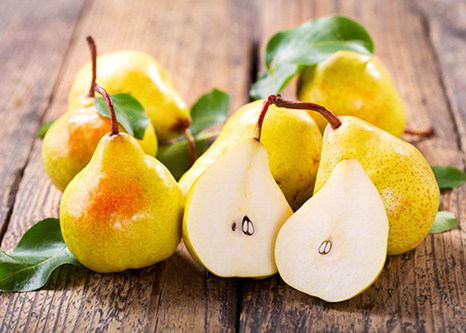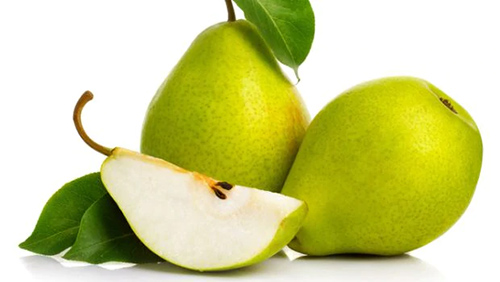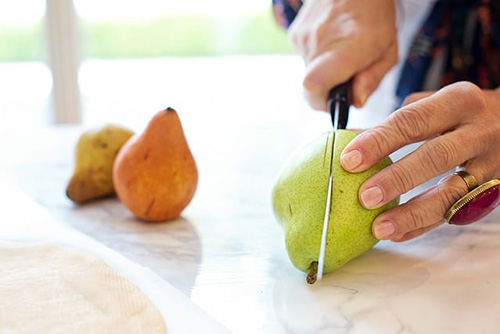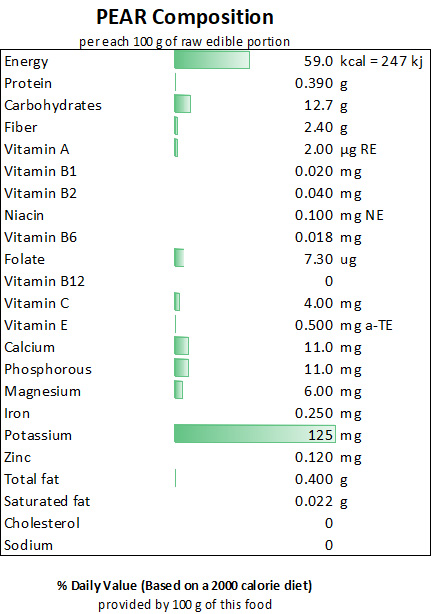Contents

The pear is a fruit with profound roots in European civilization. There is archeological evidence of pear health benefits three thousand years before the birth of Christ. Ancient Greco-Roman medical and botanical writers already knew about the health benefits of pears.
When a pear is eaten at its ripest peak, it is among the sweetest and most juicy fruits. However, they’re not easy to find in supermarkets like this. When it comes to pears vs apples, pears do not last long: If the pear is green and hard today, it will be overripe and unfit to eat tomorrow. Storing pears in the refrigerator allows you to keep them a few days more than at room temperature, but you cannot keep them long. However, the pear health benefits are numerous.
Medicinal Properties

Pears are famous for their sugar content (12.7%), while they lack proteins (o.39%) and fats (0.4%). The most plentiful sugars are fructose and levulose; therefore, people with diabetes tolerate them well.
Pears contain minute sums of vitamins E, B, and C. Iron, magnesium, and potassium are among this fruit’s essential minerals. Pears are also a great source of trace elements such as manganese and copper and, in a lesser amount, zinc. The pear’s vitamin and mineral content are slightly more significant than apples.
Pears are also a great source of fiber (2.4%), which is a little less than the apple (2.7%). Compared to the apple, the pear contains a more significant amount of insoluble fiber, rich in lignin, a material responsible for making wheat bran and wood hard.
The soluble fiber in this fruit is more effective in lowering cholesterol; hence, the insoluble is more effective as a laxative. Regarding non-nutritive components, the pear possesses fewer organic acids than the apple and a more significant tannins balance. These are responsible for the absorbent and anti-inflammatory effects of pears.
Pear Health Benefits
The pear is also a diuretic, remineralizing, a mild astringent, and refreshing. Other pear health benefits include:
High Blood Pressure
The pear’s capacity to lower blood pressure has been known for ages. This is attributed to its diuretic effect. Today it is known, as well, that the pear contains no sodium. This mineral retains water within the body, thus increasing blood pressure.
Additionally, the pear is rich in potassium, a mineral with the opposite effect of sodium. Studies demonstrate that the higher the potassium intake, the lower the risk of hypertension. However, continuous studies relating diet to hypertension of apparently unknown causes are constantly occurring.
Renal Failure

The pear encourages renal activity. As a result, this fruit is strongly advised in situations of renal failure brought on by nephritis or nephrosis. As mentioned above, the pear is a rich source of potassium and has no salt and very little protein. It has little diuretic impact, which is advantageous for renal diseases. In cardiac and renal edema situations, consuming plenty of pears is advised.
Excess Uric Acid
Consuming pears enhances the urine’s ability to remove uric acid and other nitrogenated compounds. They have a blood-alkalizing action advantageous in detoxifying diets because they balance out extra acid residues left over from a high-meat diet.
Obesity
The pear should be included in weight loss diets because of its mild diuretic action and depurative effect.
Digestive disorders
When the pear is ripe and delicate, it digests quickly and effectively. It has been digested and is in the large intestine, according to evidence, 90 minutes after eating. In cases of colitis (inflammation of the large intestine) and intestinal dyspepsia, it has moderate astringent activity. It combats intestinal putrefaction and flatulence (indigestion at the intestinal level).
Scientific Facts
- FRENCH: Poire
- SPANISH: Pera
- GERMAN: Birne
- DESCRIPTION: The pear is the fruit of the pear tree (‘Pyrus communis’ L.), a tree similar to the apple of the botanical family Rosaceae.
- ENVIRONMENT: Pears are cultivated in all temperate regions of the world.
How to Prepare
- RAW: You must chew pears thoroughly, mainly the tough ones with a gritty texture. Make sure to peel your pear before eating it (because of potential external contamination). However, in the pear’s case, the peel has a dietary value, including diuretic benefits. Therefore, it is best to buy organic or wash them thoroughly.
- COOKED: Cooked pears are more comfortable in the digestive process; unfortunately, cooking them destroys the vitamins while leaving the minerals and sugars intact.
- COMPOTES and JAMS.

Although a diuretic and preventer of high blood pressure, the pear is a luscious fruit that is more thirst-quenching than ice cream.
DISCLAIMER: All content on this website is presented solely for educational and informational objectives. You should not rely on the information provided as a replacement for advice, diagnosis, or treatment from a qualified medical expert. If you are pregnant, nursing, or have any preexisting medical concerns, you should talk to your doctor before using any herbal or natural medicines.
REFERENCES
- George D. Pamplona-Roger, M.D. “Encyclopedia of Foods and Their Healing Power.” George D. Pamplona-Roger, M.D. Encyclopedia of Foods and Their Healing Power. Trans. Annette Melgosa. Vol. 2. Chai Wan: Editorial Safeliz, 2005. 112,113. Print. [pear health benefits]
- USDA Pears Page: https://fdc.nal.usda.gov/fdc-app.html#/food-details/169118/nutrients
- California Pear Board: https://www.calpear.com/industry/about-the-pear-board/
- World Health Organization Fruit and Vegetable Consumption Factsheet: https://www.who.int/data/gho/indicator-metadata-registry/imr-details/3417
